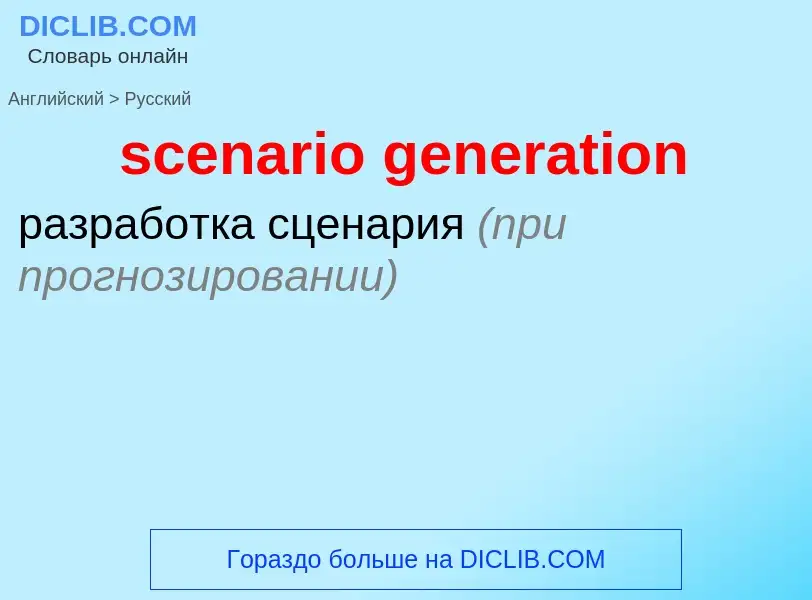Traducción y análisis de palabras por inteligencia artificial ChatGPT
En esta página puede obtener un análisis detallado de una palabra o frase, producido utilizando la mejor tecnología de inteligencia artificial hasta la fecha:
- cómo se usa la palabra
- frecuencia de uso
- se utiliza con más frecuencia en el habla oral o escrita
- opciones de traducción
- ejemplos de uso (varias frases con traducción)
- etimología
scenario generation - traducción al ruso
общая лексика
Fourth Generation Language
язык 4-го поколения, язык уровня 4GL
базирующиеся на словарях языки программирования, позволяющие увеличить производительность разработки систем, когда программы пишутся так, что состоят из команд прикладного пакета (обычно написанного на языках 2GL и/или 3GL). Например, программы на языках СУБД (FoxBase, Paradox и др.). К 4GL относятся языки запросов (SQL) и отчетов
Definición
Wikipedia
Scenario planning, scenario thinking, scenario analysis, scenario prediction and the scenario method all describe a strategic planning method that some organizations use to make flexible long-term plans. It is in large part an adaptation and generalization of classic methods used by military intelligence.
In the most common application of the method, analysts generate simulation games for policy makers. The method combines known facts, such as demographics, geography and mineral reserves, with military, political, and industrial information, and key driving forces identified by considering social, technical, economic, environmental, and political ("STEEP") trends.
In business applications, the emphasis on understanding the behavior of opponents has been reduced while more attention is now paid to changes in the natural environment. At Royal Dutch Shell for example, scenario planning has been described as changing mindsets about the exogenous part of the world prior to formulating specific strategies.
Scenario planning may involve aspects of systems thinking, specifically the recognition that many factors may combine in complex ways to create sometimes surprising futures (due to non-linear feedback loops). The method also allows the inclusion of factors that are difficult to formalize, such as novel insights about the future, deep shifts in values, and unprecedented regulations or inventions. Systems thinking used in conjunction with scenario planning leads to plausible scenario storylines because the causal relationship between factors can be demonstrated. These cases, in which scenario planning is integrated with a systems thinking approach to scenario development, are sometimes referred to as "dynamic scenarios".
Critics of using a subjective and heuristic methodology to deal with uncertainty and complexity argue that the technique has not been examined rigorously, nor influenced sufficiently by scientific evidence. They caution against using such methods to "predict" based on what can be described as arbitrary themes and "forecasting techniques".
A challenge and a strength of scenario-building is that "predictors are part of the social context about which they are trying to make a prediction and may influence that context in the process". As a consequence, societal predictions can become self-destructing. For example, a scenario in which a large percentage of a population will become HIV infected based on existing trends may cause more people to avoid risky behavior and thus reduce the HIV infection rate, invalidating the forecast (which might have remained correct if it had not been publicly known). Or, a prediction that cybersecurity will become a major issue may cause organizations to implement more secure cybersecurity measures, thus limiting the issue.



.png?width=200)
![French [[poilu]]s on a battlefield during the First World War French [[poilu]]s on a battlefield during the First World War](https://commons.wikimedia.org/wiki/Special:FilePath/French trench battle.jpg?width=200)
![Jack]] in 1924. Stein is credited with bringing the term "Lost Generation" into use. Jack]] in 1924. Stein is credited with bringing the term "Lost Generation" into use.](https://commons.wikimedia.org/wiki/Special:FilePath/GertrudeStein JackHemingway Paris.jpg?width=200)

![Vitagraph]] film, 1912) Vitagraph]] film, 1912)](https://commons.wikimedia.org/wiki/Special:FilePath/Scene from 'Lady of the Lake' (Vitagraph film), 1912.jpg?width=200)

![Family in [[Queensland]] pictured at home (circa 1900) Family in [[Queensland]] pictured at home (circa 1900)](https://commons.wikimedia.org/wiki/Special:FilePath/StateLibQld 1 169147 Andersen family photographed in their living room at Swanfels, Queensland, ca. 1900.jpg?width=200)

![[[Typewriter]]s entered common use as a writing tool for the Lost Generation [[Typewriter]]s entered common use as a writing tool for the Lost Generation](https://commons.wikimedia.org/wiki/Special:FilePath/Underwoodfive.jpg?width=200)
![A young woman burning a cable for scrap at a shipbuilding yard in [[Glasgow]] during World War I. A young woman burning a cable for scrap at a shipbuilding yard in [[Glasgow]] during World War I.](https://commons.wikimedia.org/wiki/Special:FilePath/Women in the First World War Q110080.jpg?width=200)
